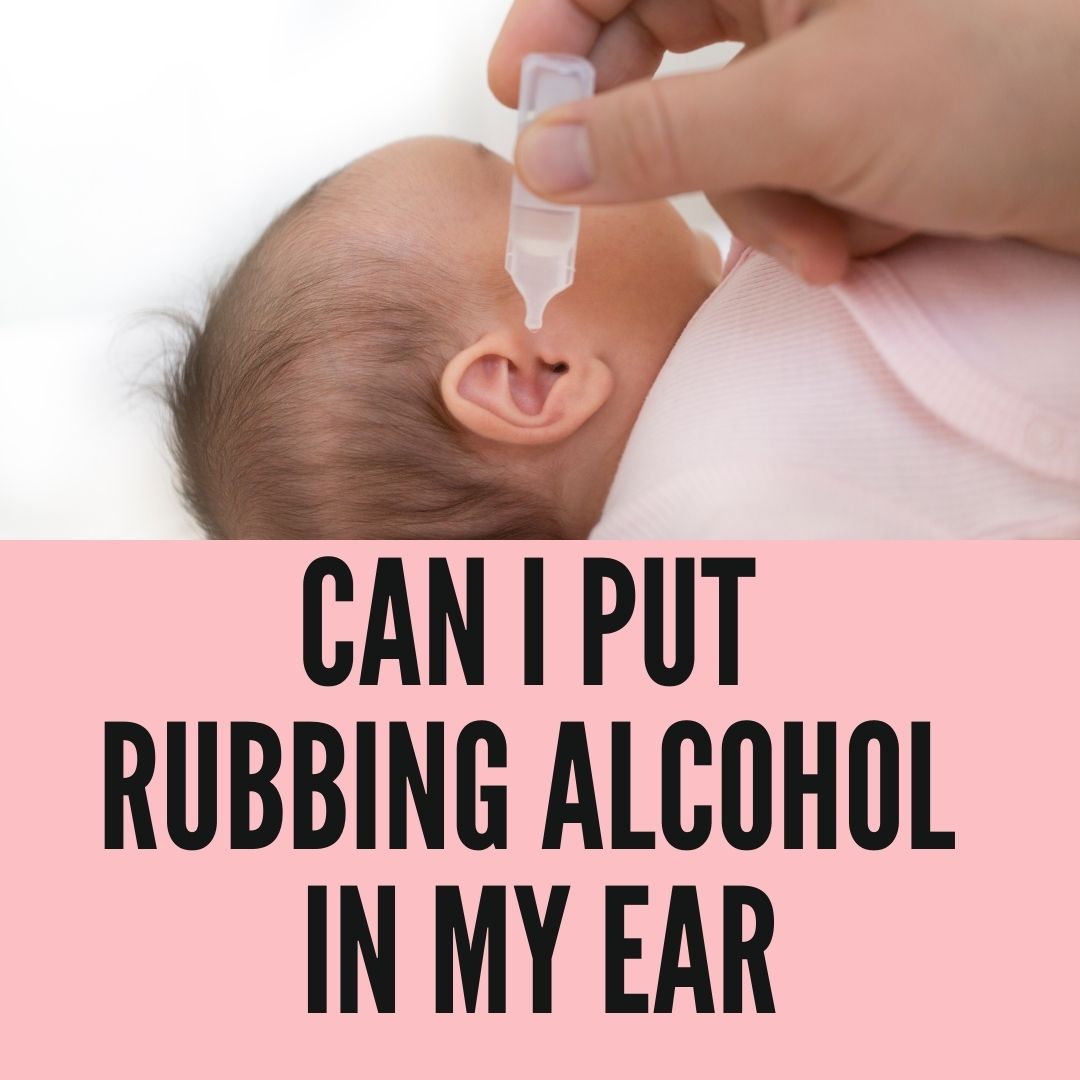
There aren’t many things that can ruin your day like an ear infection or a blocked ear since you’re constantly aware of the discomfort or pain that it’s causing you. There are many home remedies to this condition, and many of them contain rubbing alcohol.
So can you put rubbing alcohol in your ear? Yes, it is safe to put rubbing alcohol in your ear. The main reason why most people put rubbing alcohol in their ears is that they’re trying to treat an ear infection, but rubbing alcohol can also be used to treat other ear-based issues.
According to the National Library of Medicine, The mucociliary part of the middle ear mucosa is adversely affected by 400 ppm of IPA. Recovery takes two weeks. At a concentration of more than 10 times the allowable level, moderate deterioration of ciliary activity and severe damage to cells was observed and recovery after two weeks was not seen.
Note: Acute exposure to IPA at 400 ppm, the allowable limit, can cause mucus obstruction to middle ear mucosa. Recovery from damage due to Higher concentration may take up to 2 weeks. You can opt to use ethanol instead of isopropyl alcohol when treating ear problems or any other human body part.
However, don’t expect this to be a magical remedy to whatever you’re suffering from. Before attempting a home remedy, you should always consult a doctor for medical advice.

There are a few caveats to consider when it comes to putting rubbing alcohol in your ear, like the conditions that it can treat and those that it can’t. I’ll take a more detailed look at when you should and shouldn’t put rubbing alcohol in your ear, and then I’ll cover a few alternatives if you don’t have any rubbing alcohol available.
Is it Safe to Put Rubbing Alcohol in my Ear?
The main reason why most people put rubbing alcohol in their ear is that they’re trying to treat an ear infection, but rubbing alcohol can also be used to treat other ear-based issues.
I’ll go over each of these conditions to give you a better idea of how rubbing alcohol should be used to treat them and how you should administer the solution:
- Ear infection
- Swimmer’s ear
- Ear blockage
Ear Infections
Rubbing alcohol is considered a good treatment for ear infections because of its effectiveness at killing bacteria in the local area. It is used as an antiseptic because it dries out bacteria until they die by permeating the cellular membrane and replacing the water that was previously keeping the cell alive.
Despite rubbing alcohol being lethal to bacteria that can cause ear infections, it will not do permanent damage to your ear, provided you use the right form of alcohol. You’ll want to avoid treating your ear problems with isopropyl alcohol, as that is toxic to humans. Stick to using ethanol instead.
- Debrox Ear Wax Removal Drops use microfoaming action to gently soften and loosen excess ear wax, allowing it to easily drain
- This ear wax remover can relieve ears from excess ear wax caused by frequently wearing earbuds, in-ear headphones, hearing aids, and ear plugs
- Debrox makes ear wax removal at home easy and safe these ear drops contain 6.5% carbamide peroxide to aid in the removal of ear wax
- This gentle and non-irritating ear wax remover is safe for adults and children over 12 years of age; children under 12 years should consult a doctor
- Contains 1 bottle of Debrox Ear Wax Removal Drops, 0.5 fl oz and a soft, rubber bulb syringe; squeeze 5-10 ear drops in each ear and flush with water using the bulb syringe
Keep in mind that rubbing alcohol should only be used on your ear if you have an outer ear infection.
Middle and inner ear infections won’t be helped by rubbing alcohol because it won’t be able to penetrate deeply enough into the ear canal to make a significant difference in the infection.
You should also avoid using rubbing alcohol to treat an ear infection if you’re experiencing drainage (meaning that fluid is leaking out of your ear).
A common solution that is used for ear infections is a mixture of equal parts apple cider vinegar and rubbing alcohol, as both substances are effective at killing off bacteria and microorganisms.
Swimmer’s Ear
A swimmer’s ear is a form of ear infection that is caused by water entering your ear and not leaving it after you go swimming.
Because of the moist environment created in your ear, it becomes a breeding ground for bacteria and other microorganisms that can result in an ear infection.
Rubbing alcohol is frequently used to treat this condition, and you’re expected to use a similar solution that you would for an ear infection.
- For effective relief from ear wax build-up
- Replacement Ear Drops (Carbamide Peroxide) to loosen wax gently
- To be used with Ear Wash as a complete ear wax removal system
- Available in System Kit and Refill Drops
Instead of mixing equal parts apple cider vinegar and rubbing alcohol, merely replace the apple cider vinegar with white vinegar and you’re ready to treat your case of swimmer’s ear.
You should only put about one teaspoon of the solution into your ear at a time before letting it drain out of the ear. If you’re experiencing symptoms in both ears, repeat the process for the other ear.
Ear Flushing
Ear flushing isn’t a condition like the other two things we’ve explored so far, but it is used to help counter earwax buildup or even debris that has become lodged in your ear canal.
If you don’t diligently clean the wax out of your ears, it may even reach the point where your hearing gets blocked.
Most ear flushing solutions are made of a mix of equal parts white vinegar and rubbing alcohol, but some professionals recommend mixing boric acid into the solution as well.
This helps break down the earwax, making it easier to drain out when the mix of alcohol and vinegar comes out of your ear.
Keep in mind that ear flushing can have some unexpected temporary side effects like dizziness, ear discomfort, and even tinnitus (ear ringing).
- Contains One - 16 fl oz Bottle of Food Grade Hydrogen Peroxide
- It Works! The ultimate cleaner for 1st AID cuts and scrapes; BODY ears, throat and diffusers; HOUSEHOLD counters, surfaces, cutting boards, laundry, stains, toothbrush and baby gear; FOOD nuts, seeds, grains, veggies, fruit, meat, fish and chicken; PETS oral care and skunk odor; and PLANTS vase water and sprouts.
- It's Clean! Free of toxic stablizers found in brown bottle peroxide. NON GMO. Great for homes with gray water systems.
- It's Safe! Won't burn like 35% or even 6% H202
- It's Planet Positive! It's good for the environment making grass greener and oceans cleaner.
Here are some other posts that might interest you:
- Can Rubbing Alcohol Kill Lice?
- What Is Rubbing Alcohol?
- Alternative to Rubbing Alcohol for Cleaning Electronics
- Are Isopropyl and Rubbing Alcohol the Same?
- Can You Use Rubbing Alcohol to Remove CPU Thermal Paste?
Alternatives to Rubbing Alcohol for Cleaning Your Ears
If you don’t have rubbing alcohol at your disposal, there are plenty of alternatives to it that are available to you.
As you may have guessed from the above solutions, vinegar can accomplish much of the same work that rubbing alcohol can, and you can replace the alcohol in each of those solutions with warm, clean water.
If you don’t have any vinegar available, ear drainage solutions have also been made out of warm olive oil, though this will not necessarily kill any bacteria living in your ear.
Instead, the olive oil will help break down the earwax that is causing a blockage, making it a good choice for ear drainage but not for infections.
Other ways to soften your earwax and make way for ear drainage include baby oil, mineral oil, and even hydrogen peroxide.
These solutions aren’t as fast-acting as vinegar or rubbing alcohol, but they will soften the earwax enough to be removed with a flush of hot water after a day or two.
When to See a Doctor for Your Ear
If you’re experiencing any symptoms of an ear infection, it’s essential that you go and speak to your general practitioner as soon as possible so they can diagnose the issue.
These symptoms include discomfort or pain in your ear canal, including swelling or itchiness.
You should also see a doctor if your ear is completely blocked by earwax or debris, and you should especially seek medical help if there is fluid draining from your ear.

My name is Logan, and I’m a 36-year-old dad who owns a small pressure-washing company in the suburbs of Atlanta, Georgia. My main goal with rubbing-alcohol.com is to show you how versatile isopropyl rubbing alcohol can be! I hope. You find it useful.



